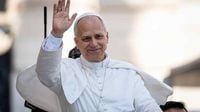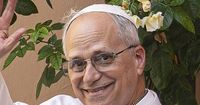When Cardinal Blase Cupich of Chicago announced that Senator Dick Durbin would be offered a lifetime achievement award for his work on immigration reform, few could have predicted the storm it would unleash within the American Catholic community. The honor, to be presented at the Archdiocese’s “Keep Hope Alive” benefit in November 2025, was meant to recognize Durbin’s decades-long advocacy for immigrants. But as news of the award spread, it ignited a fierce debate about what it truly means to be "pro-life"—a debate that quickly drew in bishops, the Vatican, and even the White House.
Senator Durbin, a Democrat and practicing Catholic who has represented Illinois in Congress for more than 40 years, ultimately declined the award. According to The Associated Press, his decision followed a wave of criticism from conservative U.S. bishops and Catholic groups, who cited his support for abortion rights as incompatible with Catholic teaching. Bishop Thomas John Paprocki of Springfield, where Durbin resides, had already barred him from receiving Communion back in 2004 due to his stance on abortion. Paprocki was among the most vocal opponents of the award, stating he was “grateful” for Durbin’s decision and urging Catholics to “pray for the human dignity of all people to be respected in all stages of life including the unborn and immigrants.”
Another critic, Bishop Carl A. Kemme of Wichita, argued that Durbin’s “long held views and consistent votes promoting abortion clearly disqualify him for this award by the Archdiocese of Chicago.” The Catholic League, a lay organization, also pressured Durbin to turn down the honor, sending him a letter and launching a petition campaign.
Yet the controversy was far from one-sided. The debate reached Rome, where Pope Leo XIV, a Chicago native and the first American pope, weighed in. Speaking to EWTN News on October 1, 2025, Leo XIV called for "respect for both sides" but also highlighted the contradictions at the heart of the American Catholic debate. "Someone who says 'I'm against abortion but says I am in favor of the death penalty' is not really pro-life," the pope said, according to Reuters. "Someone who says that 'I'm against abortion, but I'm in agreement with the inhuman treatment of immigrants in the United States,' I don't know if that's pro-life."
His comments echoed longstanding Catholic doctrine, which opposes both abortion and capital punishment and calls for the humane treatment of migrants. Leo XIV stressed the need to consider a public official’s overall record, noting Durbin’s four decades of public service. “I don't know if anyone has all the truth on them but I would ask first and foremost that there be greater respect for one another and that we search together both as human beings, in that case as American citizens or citizens of the state of Illinois, as well as Catholics to say we need to, you know, really look closely at all of these ethical issues and to find the way forward in this church. Church teaching on each one of those issues is very clear,” he said.
The pope’s intervention arrived at a moment of intense polarization within the U.S. Church. Cardinal Cupich, a close adviser to the late Pope Francis, acknowledged the controversy in his statement announcing Durbin’s decision. He lamented that “essentially no Catholic public officials” can fully align with Catholic social teaching due to the limitations of the American party system. “Total condemnation is not the way forward, for it shuts down discussion,” Cupich wrote. He argued that U.S. Catholics are left “politically homeless” as neither the Republican nor Democratic party fully encapsulates the breadth of Catholic values.
Meanwhile, the White House was drawn into the fray. President Donald Trump, whose administration has prioritized strict immigration enforcement and efforts to reinstate the death penalty, has found himself at odds with the Vatican before. At a briefing on October 1, 2025, press secretary Karoline Leavitt rejected the pope’s implicit criticism, saying, “This administration is trying to enforce our nation’s laws in the most humane way possible.” When pressed about allegations of inhumane treatment of immigrants, Leavitt stated, “I would reject there was inhumane treatment of illegal immigrants in the United States under this administration.”
The tension between the pope’s teachings and the Trump administration’s policies is not new. Pope Leo XIV’s predecessor, Francis, had also criticized U.S. immigration policies, warning that mass deportations were causing a "major crisis." But Leo XIV’s uniquely American background and his willingness to address contentious domestic issues have brought a sharper focus to the divide within American Catholicism—especially as the pope’s influence extends to more than 1 billion Catholics worldwide, including prominent U.S. political figures like Vice President JD Vance and Secretary of State Marco Rubio.
Social media has become a battleground for these debates. The pope’s recent posts urging ecological responsibility as an expression of faith have been met with derision from some self-identified Christians. “Climate change is a hoax that’s only pushed by liberals who don’t understand the Bible,” one user replied to a papal statement about environmental stewardship. Another wrote, “I reject this whole heartedly. What you fail to see Mr Pope, the Bible says the heart is deceitful above all things and desperately wicked, who can understand it?”
Despite the backlash, Leo XIV has continued to advocate for a broader, more inclusive understanding of Catholic teaching. “Today, more than ever, we must return to the heart, the center of feeling and emotion, the locus of freedom,” he wrote. “Though it includes reason, the heart transcends and transforms it. Only by returning to the heart can we undergo a true ecological conversion that transforms our personal and communal style of life.”
For Senator Durbin, the episode is only the latest chapter in a long career marked by both advocacy and controversy. He has long supported abortion rights, criticizing the Supreme Court’s 2022 decision to overturn Roe v. Wade and arguing that women should have the right to make reproductive choices in consultation with their doctors, families, and consciences. “We really have to try to honor the Roe vs. Wade thinking, that there are certain times in the life of a woman that she needs to make that decision with her doctor, with her family and with her conscience and that the government shouldn't be intruding,” Durbin said in a 2005 interview with NBC News’ “Meet the Press.”
As the dust settles, the controversy over the Durbin award has laid bare the deep divisions within American Catholicism and the broader political landscape. The clash of views—between bishops, the Vatican, politicians, and the faithful—underscores just how complicated it is to reconcile religious doctrine with the messy realities of public life in the United States.


